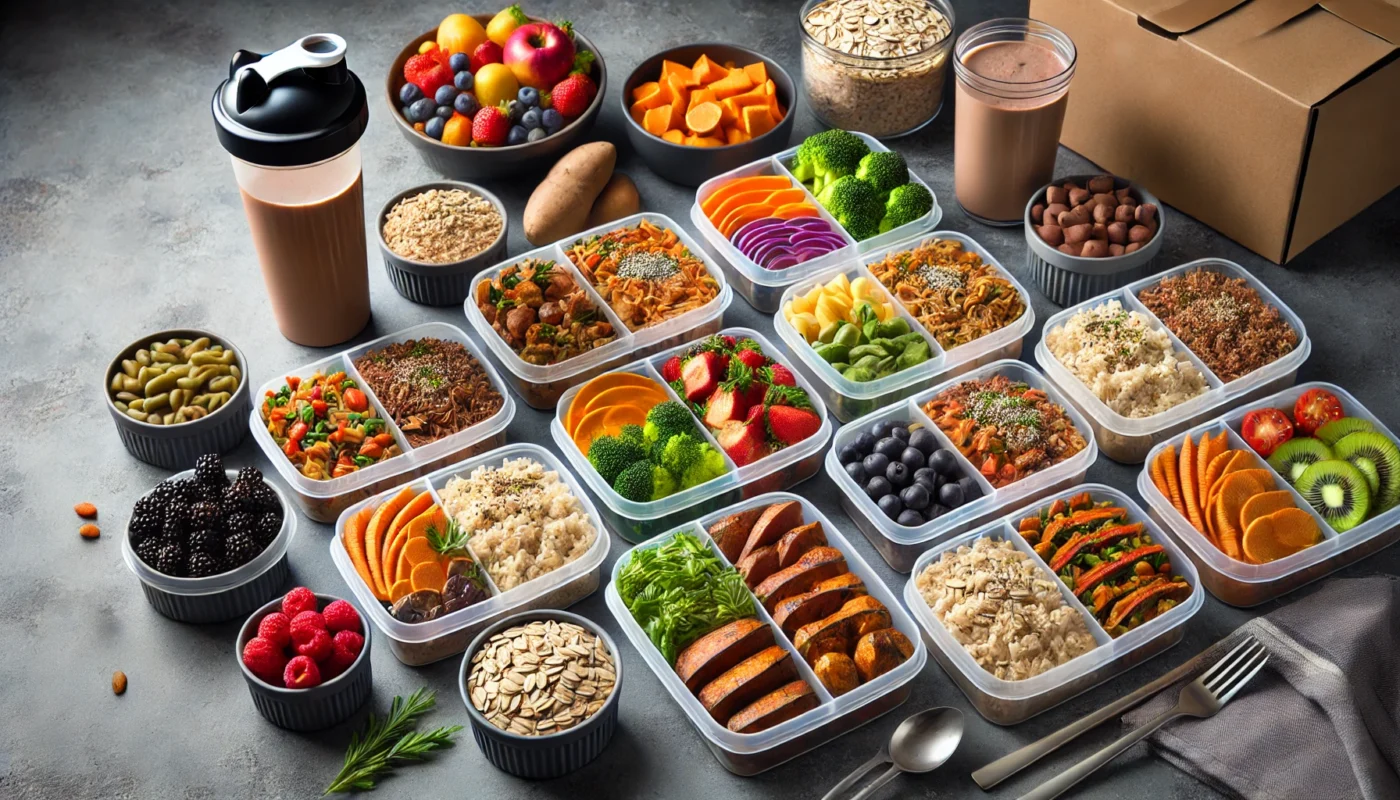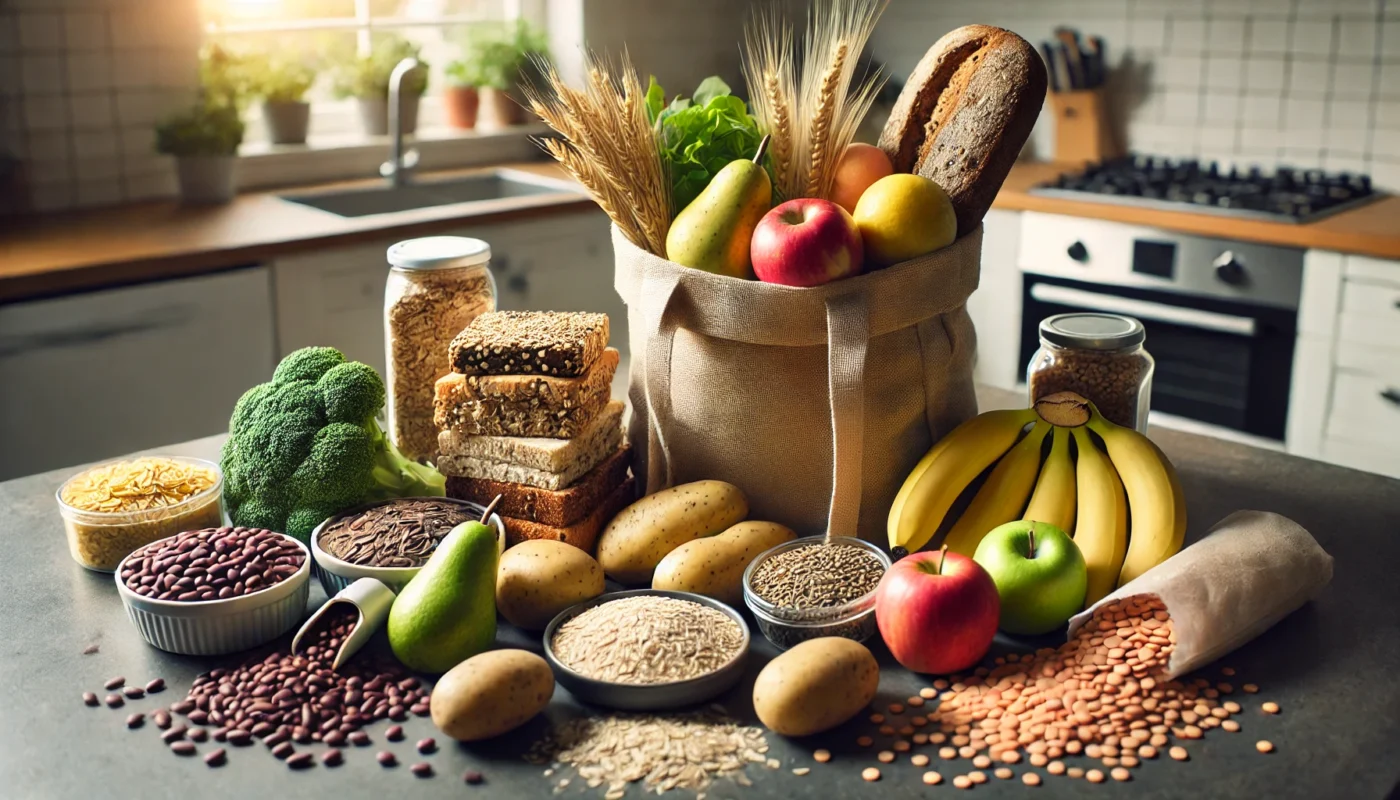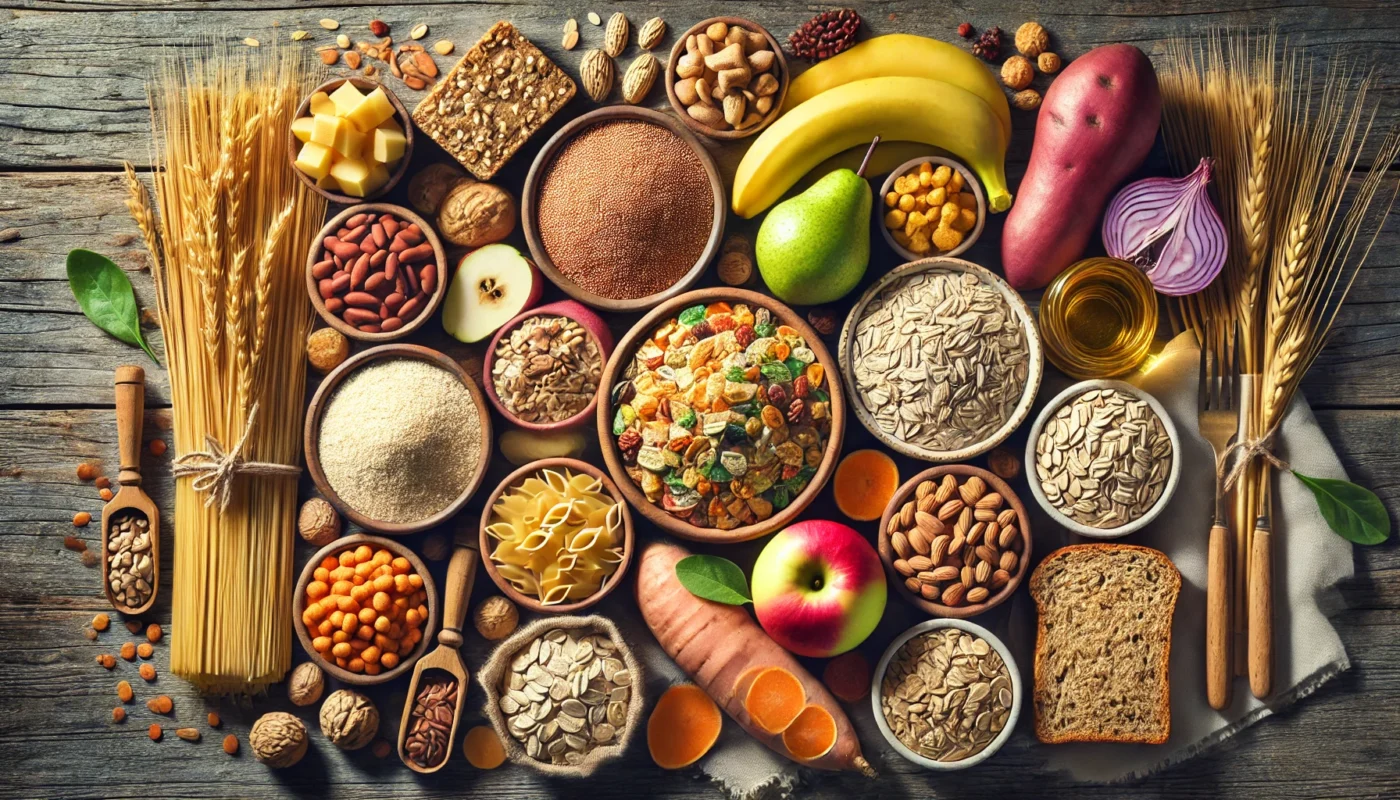In the quest for muscle growth, carbohydrates often play a pivotal yet understated role. While proteins typically receive the lion’s share of attention in muscle-building discussions, carbohydrates are equally essential for maximizing gains. Understanding the best carbohydrates to consume can significantly enhance your muscle growth journey. This article delves into the top carbohydrates for muscle building, aiming to illuminate their benefits and provide practical insights for health enthusiasts and fitness devotees alike.
You may also like: High Protein Foods to Fuel Workouts

The Role of Carbohydrates in Muscle Growth
Carbohydrates are the body’s primary source of energy, crucial for fueling workouts and enhancing recovery. They replenish glycogen stores, which are depleted during exercise. Glycogen is the stored form of glucose in muscles and liver, serving as a key energy reserve. When glycogen levels are adequately replenished, muscles recover more efficiently, paving the way for growth and repair. Moreover, carbohydrates promote an anabolic environment by stimulating insulin release, a hormone that plays a vital role in muscle protein synthesis.
Energy Source for Workouts
Carbohydrates provide the immediate energy needed for high-intensity workouts. During exercise, the body breaks down glycogen to release glucose, fueling muscles and enhancing performance. Without sufficient carbohydrate intake, fatigue can set in quickly, compromising workout quality. Therefore, a diet rich in carbohydrates ensures you have the stamina and energy required to push through demanding training sessions.
Recovery and Muscle Repair
Post-workout recovery is crucial for muscle repair and growth. Carbohydrates play a significant role in this process by replenishing glycogen stores depleted during exercise. Consuming carbohydrates after workouts not only speeds up recovery but also maximizes the anabolic window, a critical period for muscle repair. By restoring glycogen levels, carbohydrates help prevent muscle breakdown and support the repair and growth of muscle fibers.
Insulin and Muscle Protein Synthesis
Insulin, a hormone released in response to carbohydrate consumption, is essential for muscle protein synthesis. It facilitates the uptake of amino acids into muscle cells, promoting muscle growth. Furthermore, insulin helps prevent muscle protein breakdown by reducing the rate of protein degradation. This anabolic environment created by insulin enhances overall muscle development, making carbohydrates indispensable in any muscle-building diet.
Carbohydrates vs. Protein: A Balanced Approach
A common misconception is that protein alone is sufficient for muscle building. While protein supplies the amino acids necessary for muscle repair, carbohydrates are indispensable for energy and recovery. Without adequate carbohydrates, the body may begin to break down muscle protein for energy, counteracting your muscle-building efforts. Thus, a balanced intake of both macronutrients is essential for optimal muscle growth.

Best Carbohydrates for Muscle Gain
When selecting carbohydrates for muscle growth, focusing on nutrient-dense, complex carbohydrates is crucial. These carbs digest slowly, providing a sustained release of energy and keeping insulin levels steady. Here are some of the best carbohydrates for muscle gain:
Oats: A Muscle-Building Staple
Oats are a staple in many muscle-building diets due to their high fiber content and low glycemic index. They provide a steady release of energy, making them ideal for pre-workout meals. Additionally, oats contain beta-glucans, a type of soluble fiber that supports heart health and improves digestion. The versatility of oats allows for various preparation methods, including overnight oats, smoothies, and energy bars, making them a convenient choice for any meal plan.
Sweet Potatoes: Nutrient-Packed Powerhouses
Sweet potatoes are rich in vitamins, minerals, and antioxidants. They offer a substantial amount of complex carbohydrates and are an excellent source of beta-carotene, which supports immune function and vision health. Their natural sweetness and versatility make them a favorite among athletes. Sweet potatoes can be roasted, mashed, or incorporated into soups and stews, providing a delicious and nutritious option for muscle growth.
Brown Rice: A Versatile Whole Grain
Brown rice is a whole grain that provides essential nutrients like magnesium, phosphorus, and B vitamins. It’s a versatile carb that pairs well with protein-rich foods, making it a convenient choice for muscle gain. Its slow digestion rate ensures sustained energy release, suitable for prolonged workouts. Brown rice can be used in stir-fries, salads, or as a base for grain bowls, allowing for endless culinary possibilities.
Quinoa: The Complete Protein Carb
Quinoa is a complete protein source, meaning it contains all nine essential amino acids. It’s also high in fiber and magnesium, supporting muscle contractions and energy metabolism. Quinoa’s versatility allows it to be used in salads, stir-fries, and breakfast bowls. Its nutty flavor and fluffy texture make it a delicious and nutritious addition to any muscle-building diet.
Whole Grain Pasta: Carb-Loading Made Easy
Whole grain pasta is an excellent carbohydrate source, offering more fiber and nutrients than its refined counterparts. It’s ideal for carb-loading before endurance activities and pairs well with various protein sources for balanced meals. Whole grain pasta can be dressed with tomato sauce, tossed with vegetables, or incorporated into casseroles, providing a filling and satisfying option for athletes.
Legumes: Dual-Action Carbs and Protein
Legumes, including lentils, chickpeas, and black beans, are rich in both carbohydrates and protein. They provide a high fiber content that aids digestion and maintains stable blood sugar levels. Incorporating legumes into your diet can enhance muscle growth and overall health. Legumes can be used in soups, stews, or salads, adding texture, flavor, and nutrition to your meals.
High Carb Foods for Bulking
For those focused on bulking, incorporating high-carb foods into your diet can significantly enhance muscle-building efforts. These foods provide the energy required for intense workouts and support recovery. Consider integrating the following high-carb options:
Fruits: Nature’s Quick Energy Source
Fruits like bananas, apples, and berries are excellent sources of quick-digesting carbohydrates. They offer natural sugars and essential vitamins and minerals. Bananas, in particular, are rich in potassium, which supports muscle function and recovery. Consuming fruits as pre-workout snacks or post-workout recovery can provide a quick energy boost and aid in muscle repair.
Starchy Vegetables: Versatile and Nutritious
Starchy vegetables such as corn, peas, and butternut squash provide complex carbohydrates and a range of vitamins and minerals. These vegetables can add variety to your diet while supporting muscle-building goals. They can be roasted, steamed, or mashed, offering different textures and flavors to complement your meals.
Whole Grain Bread: Convenient and Nutritious
Whole grain bread is a convenient and nutritious carb source. Opt for options with seeds and nuts for added protein and healthy fats. Whole grain bread can be a base for sandwiches or a side for hearty soups and stews. Its high fiber content aids in digestion and keeps you feeling full, making it an excellent choice for those aiming to gain muscle mass.
Cereals: A Breakfast Boost
Whole grain cereals, such as bran flakes or oatmeal, provide a quick and easy source of carbohydrates. They are often fortified with vitamins and minerals, adding nutritional value to your meal. Pairing cereals with milk or yogurt can enhance protein intake, making breakfast a powerful start to your day and supporting muscle growth.
Energy Bars: On-the-Go Fuel
Energy bars, particularly those made with whole grains and natural sweeteners, offer a convenient carbohydrate source for athletes. They are ideal for quick energy boosts before or after workouts. Choose bars with minimal added sugars and high protein content to maximize their nutritional benefits and support muscle-building efforts.

Practical Tips for Carbohydrate Consumption
Understanding which carbohydrates to consume is only part of the equation; knowing how and when to consume them is equally important. Here are some practical tips:
Timing: Optimize Energy and Recovery
Timing carbohydrate intake around workouts is crucial for maximizing energy levels and enhancing recovery. Consuming carbohydrates before exercise provides the necessary fuel for performance, while post-workout carbs aid in recovery and muscle repair. Aim to eat a balanced meal containing carbohydrates and protein within 30 minutes of finishing your workout to optimize results.
Portion Control: Balance Macronutrients
Balancing carbohydrate intake with protein and fats is essential for a well-rounded diet. Pay attention to portion sizes to ensure you’re not overconsuming calories, which can lead to unwanted weight gain. Adjust your carbohydrate intake based on your activity level, with more carbs on training days and slightly less on rest days to maintain energy balance.
Hydration: Support Muscle Performance
Carbohydrates help retain water in your muscles, so staying hydrated is crucial for optimal performance. Adequate hydration supports nutrient transport and muscle function, enhancing overall workout effectiveness. Aim to drink water consistently throughout the day and consider electrolyte-rich beverages during intense training sessions to maintain hydration levels.
Conclusion
Carbohydrates are an integral component of any muscle-building diet, offering the energy and recovery support necessary for growth. By prioritizing complex, nutrient-dense carbohydrates like oats, sweet potatoes, and quinoa, you can fuel your workouts and optimize your muscle gains. Remember, a balanced diet that includes both carbohydrates and protein is essential for achieving your fitness goals. Embrace these nutritional strategies, and you’ll be well on your way to enhanced muscle growth and overall wellbeing.
carbohydrates, muscle growth, fitness, nutrition, workout recovery, energy sources, protein synthesis, healthy eating, bulking, complex carbohydrates, oats, sweet potatoes, brown rice, quinoa, whole grain pasta, legumes, high-carb foods, meal planning, hydration, sports nutrition
Further Reading:
The 7 Best Carbs for Muscle Growth
High-protein snacks to build muscle and keep hunger at bay
26 Foods to Eat to Gain Muscle
Important Note: The information contained in this article is for general informational purposes only, and should not be construed as health or medical advice, nor is it intended to diagnose, prevent, treat, or cure any disease or health condition. Before embarking on any diet, fitness regimen, or program of nutritional supplementation, it is advisable to consult your healthcare professional in order to determine its safety and probable efficacy in terms of your individual state of health.
Regarding Nutritional Supplements Or Other Non-Prescription Health Products: If any nutritional supplements or other non-prescription health products are mentioned in the foregoing article, any claims or statements made about them have not been evaluated by the U.S. Food and Drug Administration, and such nutritional supplements or other health products are not intended to diagnose, treat, cure, or prevent any disease.

